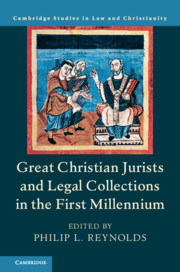Part I
Published online by Cambridge University Press: 21 June 2019
Summary
Christian leaders and scholars during the first millennium in the West were preoccupied with written norms and corrective practices. Law (lex) during this era needs to be understood in a broader normative context. This introductory chapter provides historical and historiographical background to the specialized chapters that follow, explores the notions of lex, ius, norma, regula, and canon, and proposes an overarching schema of four normative fields, as understood by authors of the period: laws, canons, penitential prescriptions, and monastic rules, with their corresponding normative practices and textual compilations. The legal status of conciliar canons and papal decretals during this era is problematic. Although scholars today usually construe these as constituting a body of law, Isidore of Seville did not, and authors of the era usually treated laws (leges) and canons as distinct but complementary categories. The final section of the chapter examines this problem, proposing several fields of inquiry that would shed light on it, and suggesting that canonical collections, as a genre, were practical but not attached to any particular application.
Keywords
- Type
- Chapter
- Information
- Publisher: Cambridge University PressPrint publication year: 2019



